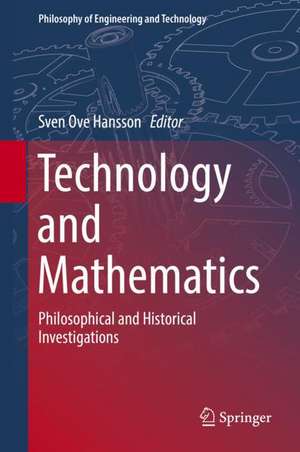Technology and Mathematics: Philosophical and Historical Investigations: Philosophy of Engineering and Technology, cartea 30
Editat de Sven Ove Hanssonen Limba Engleză Hardback – 8 noi 2018
| Toate formatele și edițiile | Preț | Express |
|---|---|---|
| Paperback (1) | 1003.24 lei 6-8 săpt. | |
| Springer International Publishing – 30 ian 2019 | 1003.24 lei 6-8 săpt. | |
| Hardback (1) | 1009.40 lei 6-8 săpt. | |
| Springer International Publishing – 8 noi 2018 | 1009.40 lei 6-8 săpt. |
Din seria Philosophy of Engineering and Technology
-
 Preț: 378.64 lei
Preț: 378.64 lei - 15%
 Preț: 662.95 lei
Preț: 662.95 lei -
 Preț: 280.88 lei
Preț: 280.88 lei - 20%
 Preț: 551.31 lei
Preț: 551.31 lei - 15%
 Preț: 646.75 lei
Preț: 646.75 lei - 24%
 Preț: 806.73 lei
Preț: 806.73 lei - 18%
 Preț: 1110.86 lei
Preț: 1110.86 lei - 15%
 Preț: 639.23 lei
Preț: 639.23 lei -
 Preț: 392.97 lei
Preț: 392.97 lei - 18%
 Preț: 958.07 lei
Preț: 958.07 lei - 15%
 Preț: 645.28 lei
Preț: 645.28 lei - 15%
 Preț: 644.63 lei
Preț: 644.63 lei -
 Preț: 394.12 lei
Preț: 394.12 lei -
 Preț: 393.52 lei
Preț: 393.52 lei - 15%
 Preț: 638.90 lei
Preț: 638.90 lei - 15%
 Preț: 660.04 lei
Preț: 660.04 lei - 15%
 Preț: 654.43 lei
Preț: 654.43 lei - 15%
 Preț: 646.43 lei
Preț: 646.43 lei - 18%
 Preț: 788.90 lei
Preț: 788.90 lei - 15%
 Preț: 646.75 lei
Preț: 646.75 lei -
 Preț: 370.49 lei
Preț: 370.49 lei -
 Preț: 387.78 lei
Preț: 387.78 lei - 18%
 Preț: 735.07 lei
Preț: 735.07 lei - 18%
 Preț: 956.18 lei
Preț: 956.18 lei - 15%
 Preț: 637.59 lei
Preț: 637.59 lei - 18%
 Preț: 787.91 lei
Preț: 787.91 lei - 15%
 Preț: 638.89 lei
Preț: 638.89 lei - 20%
 Preț: 566.75 lei
Preț: 566.75 lei - 18%
 Preț: 725.43 lei
Preț: 725.43 lei
Preț: 1009.40 lei
Preț vechi: 1230.97 lei
-18% Nou
Puncte Express: 1514
Preț estimativ în valută:
193.14€ • 201.66$ • 159.85£
193.14€ • 201.66$ • 159.85£
Carte tipărită la comandă
Livrare economică 05-19 aprilie
Preluare comenzi: 021 569.72.76
Specificații
ISBN-13: 9783319937786
ISBN-10: 3319937782
Pagini: 390
Ilustrații: XII, 373 p. 54 illus.
Dimensiuni: 155 x 235 mm
Greutate: 0.72 kg
Ediția:1st ed. 2018
Editura: Springer International Publishing
Colecția Springer
Seria Philosophy of Engineering and Technology
Locul publicării:Cham, Switzerland
ISBN-10: 3319937782
Pagini: 390
Ilustrații: XII, 373 p. 54 illus.
Dimensiuni: 155 x 235 mm
Greutate: 0.72 kg
Ediția:1st ed. 2018
Editura: Springer International Publishing
Colecția Springer
Seria Philosophy of Engineering and Technology
Locul publicării:Cham, Switzerland
Cuprins
Part I. Introductory.- 1. Preview (Sven Ove Hansson).- 2. Introduction (Sven Ove Hansson).- Part II. The historical connection.- 3. The mathematics of craftspeople (TBD).- 4. Mathematics and Mechanical Computation (Doron Swade).- 5. The concept of computation in the medieval and modern era (Sara Uckelman).- 6. Leibniz and the calculus ratiocinator (Wolfgang Lenzen).- 7. The impact of WWII cryptology on post-war mathematics (Sandy L. Zabell).- 8. The mathematical origins of modern computing (Mark Priestley).- Part III. Technological uses of mathematics.- 9. Mathematical optimization in technology (Serkan Kiranyaz).- 10. Mathematics at technological universities (Sven Ove Hansson).- 11. Mathematical models of technological and social complexity (Ronald R. Kline).- Part IV. Technological and mathematical computability.- 12. The Epistemology of Computer-Mediated Proofs (Selmer Bringsjord).- 13. The physical Church-Turing thesis (Sven Ove Hansson).- 14. Quantum information (Laura Felline).- 15. Quantum Reflections on Computational Complexity (Michael Cuffaro).- Part V. Philosophical reflections on the connection.- 16. What the applicability of mathematics tells us about its philosophy (Phillip L. Wilson).- 17. The unreasonable effectiveness of mathematics in technology (Tor Sandqvist).- 18. Practical limits to the effectiveness of mathematics (Johannes Lenhard).
Notă biografică
Sven Ove Hansson is professor in the philosophy of technology and head of the Division of Philosophy, Royal Institute of Technology, Stockholm. He is former president of the Society for Philosophy and Technology, and editor-in-chief of Theoria and the two book series Outstanding Contributions to Logic and Philosophy, Technology, and Society. He is a member of the Royal Swedish Academy of Engineering Sciences. His research areas include philosophy of science and technology, logic, value theory, decision theory, ethics, and political philosophy.
Textul de pe ultima copertă
This volume is the first extensive study of the historical and philosophical connections between technology and mathematics. Coverage includes the use of mathematics in ancient as well as modern technology, devices and machines for computation, cryptology, mathematics in technological education, the epistemology of computer-mediated proofs, and the relationship between technological and mathematical computability. The book also examines the work of such historical figures as Gottfried Wilhelm Leibniz, Charles Babbage, Ada Lovelace, and Alan Turing.
Caracteristici
Examines the interrelations between technology and mathematics Combines philosophical and historical approaches to the technology–mathematics relationship The contributors include leading experts in the philosophy and history of both technology and mathematics
